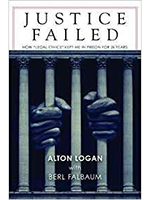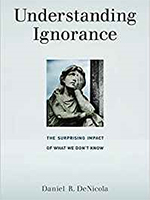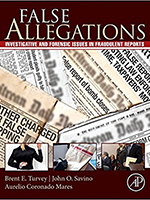 Verdict: It’s a Keeper
Verdict: It’s a Keeper
Justice Failed: How “Legal Ethics” Kept Me in Prison for 26 Years
By Alton Logan with Berl Falbaum (Berkeley, CA: Counterpoint Press, 2016). 160 pgs. $26. Order, www.counterpointpress.com.
Reviewed by Craig R. Johnson
Justice Failed, authored by Alton Logan with Berl Falbaum, should be subtitled “How Legal Ethics and Law Enforcement Misconduct Kept Me in Prison for 26 Years.” It’s the story of Alton Logan, a young Chicago resident, who was convicted of a homicide that he did not commit. The unusual twist is that the actual guilty party admitted to the crime, but the admission was protected by attorney-client privilege until the guilty man’s death years later. The lawyers for the true killer recorded his statement in affidavits, which they unsealed, after the killer’s death, with his permission.
This is the headline of the book, but only part of the injustice done to Logan. The rest is an all-too-familiar story of law enforcement officers failing to investigate thoroughly, judges excluding solid evidence linking a different suspect to the crime (evidence that the murder weapon was found in a location connected to the actual killer), and eyewitnesses making mistaken identifications. It also shows how someone like Logan, a young, poor black man with a prior criminal record, can have a bullseye on his back that results in tunnel vision for investigators. The Alton Logans of the world are quickly suspected, and even if innocent, exoneration can take a lifetime.
Want to Review a Book?
Please request a book and writing guidelines from Wisconsin Lawyer managing editor Karlé Lester, at klester@wisbar.org or (608) 250-6127. Reviewers may keep the book reviewed. Reviews of about 500 words are due within 45 days of receiving the book. Reviews are published, space permitting, in the order received and may be edited for length and clarity.
While a substantial portion of the book is devoted to the question of legal ethics, including a concluding chapter regarding potential reforms to the rules regarding client confidentiality, that question is likely more interesting to nonlawyers than it is to lawyers (in fact, Logan’s coauthor himself is a nonlawyer journalist who confesses his skepticism about the appropriateness of the rule in question).
It’s like the cliché cocktail-party question often posed to criminal defense lawyers – “How can you defend someone you know is guilty?” The answer to the question posed by Logan’s book is that the rule is necessary to protect not only clients but, ultimately, the entire adversarial system of justice. Logan himself expresses his understanding and approval of the choice made by the attorneys for the man who committed the crime for which Logan served more than two decades in prison, stating that at least they followed the rules, even if he disagrees with those rules. He does not feel the same way about the police and prosecutors, who he believes bent or broke the rules in their zeal to put the wrong man in prison.
The latter half of Logan and Falbaum’s book gets bogged down in tales of contradictory affidavits from jailhouse snitches and the starts and stops of Logan’s various appeals before the affidavits verifying his innocence were revealed. His story is another example of a life wasted not only due to legal ethics but equally because of the choices made by players in the system who valued winning above the truth.
Craig R. Johnson, U.W. 1994, practices criminal defense and labor law in Milwaukee at the firm Sweet and Associates.
 Verdict: It’s a Keeper
Verdict: It’s a Keeper
Understanding Ignorance: The Surprising Impact of What We Don't Know
By Daniel R. DeNicola (Cambridge, MA: The MIT Press, 2017). 264 pgs. $22.95. Order, http://mitpress.mit.edu.
Reviewed by Angela M. Bohmann
I have never before thought so much about what I do not know. Professor Daniel DeNicola has written a thoughtful and thought-provoking book on ignorance. The book mines four metaphors for ignorance: ignorance as place, ignorance as boundary, ignorance as limit, and ignorance as horizon.
While we tend to view ignorance as bad, DeNicola takes us through times and situations in which ignorance is the desired state. For example, the innocence of children is attributable at least in part to their ignorance of the world, an ignorance adults usually try to temporarily maintain for them. An example from the legal world is a jury trial: We ask a jury to remain ignorant of all information relating to a case other than the evidence presented. This form of strategic ignorance is mandated by the U.S. legal system.
The author quotes Donald Rumsfeld, Secretary of Defense during George W. Bush’s administration, who said this about ignorance and knowledge: “There are known knowns; there are things we know we know. We also know there are known unknowns; that is to say, we know there are some things we do not know. But there are also unknown unknowns – the ones we don’t know we don’t know.” The book delves into the known unknowns, as well as the unknown unknowns. While our knowledge is vast, what we do not know is even more vast.
The study of ignorance includes the study of probabilities. People often make decisions in the face of unknowns but taking into account the probability of a particular outcome.
A common example is the effect of a weather forecast on a planned activity. One of the nuggets of information I learned from this book is the meaning of a weather forecaster’s statement that there is a 20 percent chance of rain on a particular day. The correct meaning, per the National Weather Service, is that the probability of precipitation is the product of the confidence of the forecaster that precipitation will occur somewhere in the forecast area, and the percent of the area that will receive measurable precipitation (at least 0.1 inches), if there is any. A high confidence of precipitation and a small area can yield the same chance of rain as a low confidence and a large affected area. In other words, the probability is a combination of a degree of confidence and an area of coverage – not how most people likely would have guessed that the chance of rain would be defined.
This book is not a quick and easy read, but it is interesting and rewarding, even for someone (like me) with no background in philosophy or epistemic studies. In this age of fake news and willful ignorance, this book provides a structure for thinking about all that we do not know.
Angela M. Bohmann, Boston College 1978, is admitted to practice in Wisconsin, Minnesota, and North Dakota. She practices employee benefits law in the Minneapolis office of Stinson Leonard Street LLP.
 Verdict: Not for Me, Maybe for You
Verdict: Not for Me, Maybe for You
False Allegations: Investigative and Forensic Issues in Fraudulent Reports of Crime
By Brent E. Turvey, John O. Savino & Aurelio Coronado Mares (Cambridge, MA: Academic Press/Elsevier, 2018). 336 pgs. $84.96. Order, www.elsevier.com.
Reviewed by Michael T. Mahoney
Once upon a time I reviewed a sensitive crimes case in the Milwaukee County District Attorney’s Office, and the Milwaukee Police Department (MPD) detective sitting across from me told me that the MPD began every sensitive-crimes case with the assumption that the victim was lying. I was shocked by that, but she explained that this was the best investigative technique. The detectives did not belittle or disregard victims or treat them with less than respect. They understood that to gain a charge and conviction that would stand review by the DA, a judge, a jury, and appellate courts, this was the starting point. Cases must be built with detail, admissible evidence, and corroboration.
The authors of this book attempt to sell that point as sort of a “scientific” presentation. The premise is that everybody lies. How can prosecutors or other lawyers present evidence in court when everyone lies? The text provides some clear indicators for investigators to consider, but they are well known to law enforcement. The book squawks that there are few sanctions for people who lie during the process.
The information is timely in that the authors discuss “swatting,” health-care fraud, hate crimes, and law enforcement crimes. The book claims to be a text, but it is unclear for what type of class. The authors present several case scenarios in sufficient detail to bolster their points. The authors’ backgrounds lead me to believe that publishing this book will bolster their credibility as expert witnesses when they testify.
Cops should investigate cases properly. Prosecutors must analyze evidence, charge cases correctly and ethically, plea bargain effectively, and take cases to trial to do justice when the negotiations fall through. Because the trial is a search for the truth, jurors are instructed to follow the law and apply the jury instructions to the evidence. Judges must know and apply the rules of evidence and sentence convicted offenders properly. This book gives the reader a large number of ways in which the system can be taxed in some fashion and break down.
The book may be helpful to newer lawyers as they develop ways to efficiently examine situations. A critical eye usually provides the best view.
Michael T. Mahoney, North Dakota 1983, is a former Wisconsin prosecutor and currently serves as an assistant attorney general in Bismarck, North Dakota.
